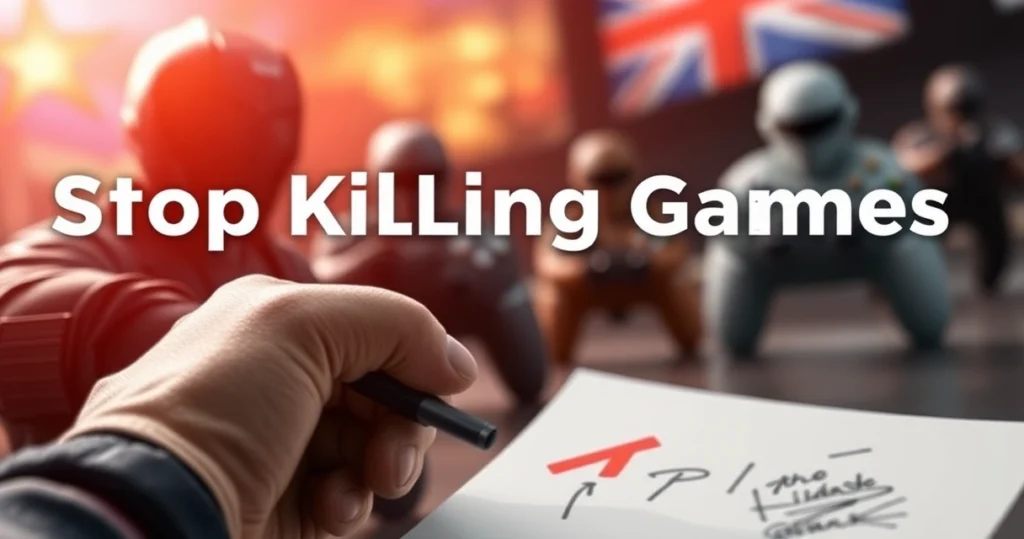In an era where digital ownership is becoming increasingly tenuous, the “Stop Killing Games” initiative has made headlines by achieving a significant milestone—over one million signatures on its petition. Founded by Ross Scott, this movement aims to ensure that players retain access to their purchased video games, even when developers decide to discontinue support or shut down servers. This petition is not just a cry from the gaming community; it represents a broader fight for consumer rights in the digital age. However, the journey is far from over, as the initiative faces challenges from potential fake signatures and pushback from major gaming studios and publishers.

As of July 6, 2023, the petition has surpassed 1.2 million signatures, prompting the European Union to contemplate legislation that could protect video game access. However, Ross Scott has cautioned that many signatures might be invalid or incorrectly filled out, necessitating an increase in the legitimate count to ensure that the petition holds up against scrutiny. The stakes are high, and the resistance from the gaming industry poses a formidable obstacle to the movement’s objectives.
The Origins of the Stop Killing Games Initiative
The “Stop Killing Games” initiative was born out of frustration and concern for the future of digital gaming. The catalyst for Scott’s campaign was Ubisoft’s controversial decision to delist “The Crew” from online platforms in 2024, effectively revoking access to the game for those who had purchased it. This action raised alarm bells among gamers—if a major company could take such drastic measures, what would stop other developers from doing the same?
The Premise of the Initiative
At its core, the initiative advocates for new laws that would ensure video games remain accessible despite the withdrawal of developer support. This is particularly crucial for online-only games, which rely heavily on active servers for functionality. The movement aims to safeguard players’ rights, allowing them to retain access to games they have legally purchased.
The Legislative Process and Challenges Ahead
With over one million signatures, the petition is set to proceed to the next stage of the legislative process. However, there are several challenges that lie ahead, both of which could impact the petition’s validity and potential for success.
Addressing Fake Signatures
One of the most pressing issues that Ross Scott highlighted is the threat posed by potentially fake signatures. Scott emphasized that while the petition has gained significant traction, the legitimacy of the signatures is paramount. “This is not a change.org petition; this is a government process,” he stated, emphasizing that spoofing signatures is a criminal offense. To counteract this, Scott has called for an additional 10 percent of signatures to be collected to account for any invalid entries. This proactive approach aims to ensure that the petition stands strong when reviewed by European lawmakers.
Industry Pushback
The movement has also encountered resistance from major gaming studios and publishers, including industry giants like Electronic Arts, Microsoft, and Nintendo. In an official statement, the Video Games Europe group expressed their opposition to the initiative. They argue that the proposed legislation could hinder creativity and innovation within the gaming industry. Their concerns revolve around the following key points:
- Private servers may not provide adequate protections for players’ data.
- Many games are designed to be online-only, and enforcing legislation could stifle developer choice.
- The initiative may increase the costs and risks associated with developing new titles.
- It could create a chilling effect on game design, potentially limiting the variety of games available to consumers.
The Broader Implications of the Initiative
The implications of the “Stop Killing Games” initiative extend far beyond the gaming community. If successful, it could set a precedent for digital ownership rights across various forms of digital media. As more consumers shift toward digital purchasing, the issue of access and ownership will only grow in importance.
Consumer Rights in the Digital Age
The initiative brings to light the ongoing debate surrounding consumer rights in an increasingly digital world. Consumers often find themselves at the mercy of corporate decisions, which can result in losing access to products they’ve purchased. The “Stop Killing Games” movement is not just about video games; it reflects a growing demand for transparency and fairness in digital transactions. As society becomes more reliant on digital platforms, protecting consumer rights will become even more critical.
Frequently Asked Questions (FAQ)
1. What is the “Stop Killing Games” initiative?
The “Stop Killing Games” initiative is a movement aimed at ensuring that players retain access to their purchased video games even when developers discontinue support or shut down servers.
2. How many signatures has the petition gathered?
As of July 6, 2023, the petition has collected over 1.2 million signatures.
3. What challenges does the initiative face?
The initiative faces challenges including the potential for fake signatures and resistance from major gaming studios and publishers.
4. Why did Ross Scott start this initiative?
Ross Scott started this initiative in response to Ubisoft’s decision to delist “The Crew” and revoke access for players, raising concerns about digital ownership.
5. What are the potential implications of this initiative?
If successful, the initiative could set a precedent for digital ownership rights, impacting various forms of digital media and consumer rights in the digital age.
Conclusion
The “Stop Killing Games” initiative has taken a significant step forward by reaching over one million signatures, marking a pivotal moment in the fight for video game access and consumer rights. However, the path ahead is fraught with challenges, including the verification of signatures and pushback from the gaming industry. As stakeholders from both sides prepare for the next phase of this battle, the outcome could have lasting implications not only for gamers but for all consumers navigating the complexities of digital ownership. As the campaign continues, it remains to be seen whether the European Union will heed the call for change and legislate in favor of safeguarding gamer rights.
📰 Original Source
Este artigo foi baseado em informações de:



